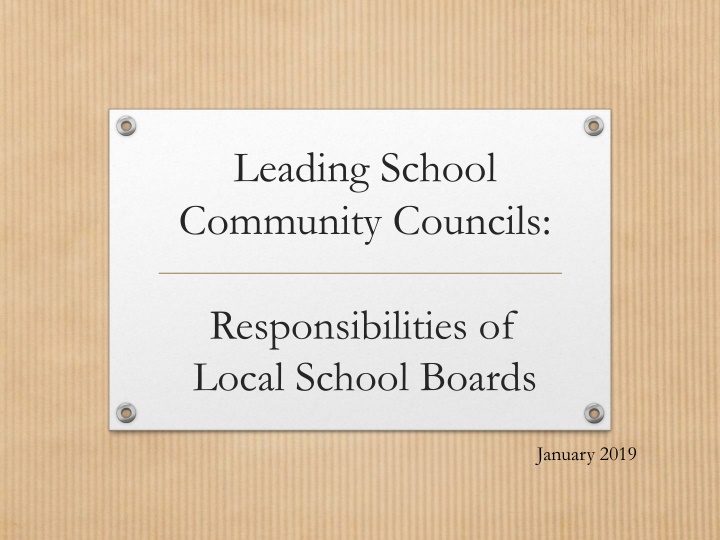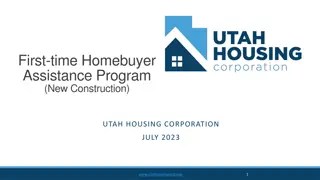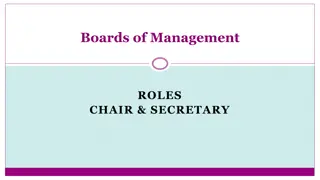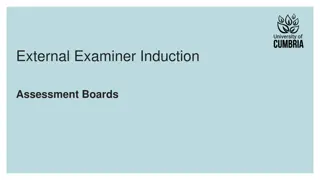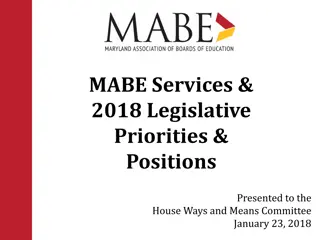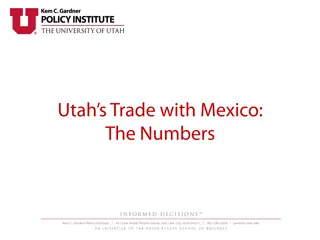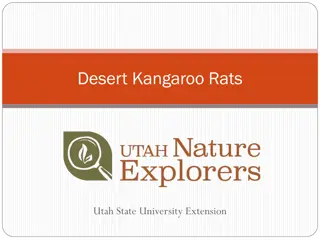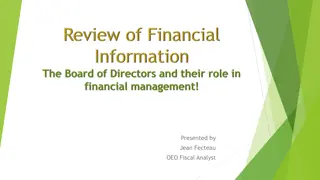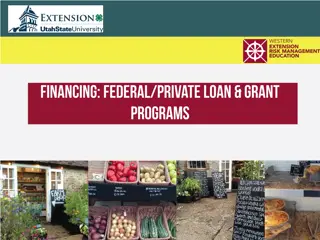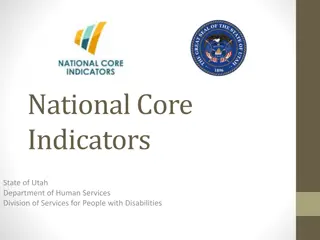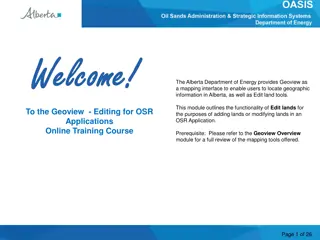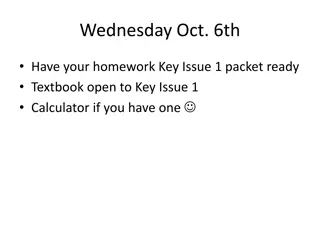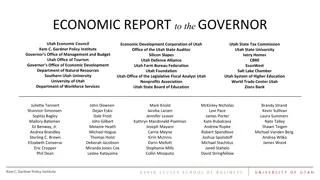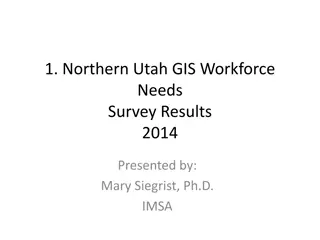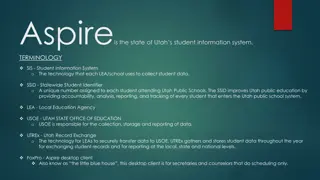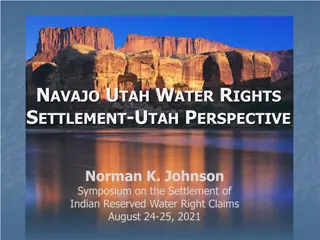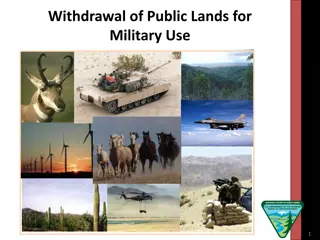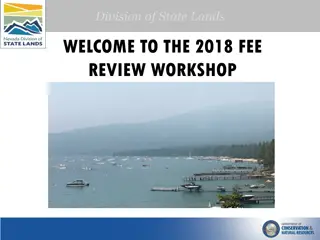Local School Boards Responsibilities & Utah School Trust Lands
School boards in Utah have crucial responsibilities in managing School LAND Trust Funding, as mandated by state legislation. The history of School Trust Lands in Utah dates back to statehood preparations, with specific terms agreed upon with the Federal Government. These lands, held in trust for school children, generate revenue through various means like mineral rights and forestry. The School Children's Trust Section oversees investments for the benefit of educational institutions.
Download Presentation

Please find below an Image/Link to download the presentation.
The content on the website is provided AS IS for your information and personal use only. It may not be sold, licensed, or shared on other websites without obtaining consent from the author.If you encounter any issues during the download, it is possible that the publisher has removed the file from their server.
You are allowed to download the files provided on this website for personal or commercial use, subject to the condition that they are used lawfully. All files are the property of their respective owners.
The content on the website is provided AS IS for your information and personal use only. It may not be sold, licensed, or shared on other websites without obtaining consent from the author.
E N D
Presentation Transcript
Leading School Community Councils: Responsibilities of Local School Boards January 2019
Local Board Responsibilities The School LAND Trust Funding is very unique because it is the only state funding where the use is driven by the local school community council and solely approved by the local school board. It is imperative that responsibility to review and approve the plans for funding be taken very seriously by the local school board. If plans are approved that do not meet the criteria set forth by the legislation and rule, it falls back on the local board to answer for their actions. USBA
Board Presidents Role Utah State Code: 53G-7-1206 (7) The president or chair of a local school board or charter school governing board shall ensure that the members of the local school board or charter school governing board are provided with annual training on the requirements of this section.
History of School Trust Lands in Utah Preparing for Statehood State agrees not to tax federal domain Federal government grants land to state for support of free, public, nonsectarian schools Utah Enabling Act Law passed by Congress offering entrance into the Union Contains terms and promises from the Federal Government Terms accepted by Utah in its Constitution
Four Types of Land Private Federal State/County/City Trust - held in perpetuity for the school children of Utah
School in Every Township Section 16 Ohio (1803) Minnesota (1858) The Arid West Sections 16 and 36 Oregon (1859) Wyoming (1890) The Really Arid West Sections 2, 16, 32 & 36 Utah, Arizona and New Mexico
Currently: Over 3.2 million surface acres of School Trust Land in Utah remain. Approximately the size of Connecticut Lands Earn Revenue From: Minerals Surface Development Grazing Forestry
SITLA SITFO Manages Trust Land Invests Trust Fund School Children s Trust Section USBE Local School Boards and SCCs Utah s School Trust Allocates Trust Funds Land Trust Protection and Advocacy Office TAC Trust Advisory Committee
Funding Flow Chart Revenues Generated From Activities on School Trust Lands Trust Land Management Expenses Earnings as figured by statute; no more than 4% of fund balance Permanent School Fund The School LAND Trust Program SITFO Budget SITFO Off Budget Expenses School Children s Trust Section Budget
Growth in Permanent Fund June 30, 1987 Balance: $ 15,271,659 November 30, 2018 Balance:
DISTRICT FY19 LAND TRUST DISTRIBUTION DISTRICT FY19 LAND TRUST DISTRIBUTION Alpine $8,200,000 Granite $6,890,000 Beaver $310,000 Iron $1,090,000 Box Elder $1,350,000 Jordan $5,620,000 Cache $1,980,000 Juab $410,000 Canyons $3,620,000 Kane $280,000 Carbon $500,000 Logan $720,000 Daggett $170,000 Millard $450,000 Davis $7,490,000 Morgan $470,000 Duchesne $680,000 Murray $810,000 Emery $380,000 Nebo $3,500,000 Garfield $250,000 N Sanpete $400,000 Grand $300,000 N Summit $260,000
DISTRICT FY19 LAND TRUST DISTRIBUTION DISTRICT FY19 LAND TRUST DISTRIBUTION Park City $650,000 Uintah $870,000 Wasatch $850,000 Piute $180,000 Washington $3,220,000 Provo $1,790,000 Wayne $200,000 Rich $200,000 Weber $3,420,000 Salt Lake $2,490,000 San Juan $450,000 Estimated Per Student: Statewide: $113 Charter: $110 Largest district: $104 Smallest district: $1,080 Sevier $620,000 S Sanpete $490,000 S Summit $320,000 Tintic $180,000 Tooele $1,800,000
For the 2019-20 School Year (FY20) the distribution will increase over 11% to $82,663,051
This amount is more than 2% of the WPU Each year, we fight to increase the WPU. How can we fight for this funding?
Role of Local Boards The end result is local school boards are the adjudicator and protector of these funds that are intended to benefit the public school children of Utah in perpetuity.
Seven Key Local Board Responsibilities in Code and Rule 1. Training provided for all School Community Council members and local Board of Ed members Read and approve School Improvement/Trust Land plan Assure compliance with state law and board rules Provide information & data to SCCs so they may complete work Annual report to councils related to Digital Citizenship Disbursement of funds to schools for adherence to LAND Trust Plan Approve election timelines 2. 3. 4. 5. 6. 7. BEST PRACTICE: Review Final Reports - either board reviews or staff reviews and reports to board.
Training Local Boards assure that training is provided for themselves and all SCC members Training must occur before school plans can be approved and the date of training(s) for boards and SCC members must be provided annually to the USBE prior to plans being approved.
The Work of SCCs School Improvement Plan School LAND Trust Plan Digital Citizenship Review The SCC acts as an advisory committee to the local board. That s where the buck stops.
Plan Approval Local Boards are Approving Entities Local boards determine the due date of the plans School LAND Trust plans come to the local boards first for their approval. Read and approve plans or return plans to SCC for amendment and resubmission before May 15th
Plan Expenditures SCC Expenditures Should be used for data-driven and evidence-based practices and services Local boards and districts may not require a council to spend SCC funds on a specific use or set of uses A SCC may spend no more than $7,000 on the following: Civic and character education Digital citizenship training If included, Behavioral Programs/PBIS must be part of a measurable academic goal
Plan Approval The local board should make sure that the money is being spent to meet critical academic needs, and that it directly impacts the instruction of students and improves academic excellence.
Plan Approval Signature forms District/Principal may choose a digital signature form or a printed form that is physically signed and uploaded. If the hard copy version is chosen, the school or district may create their own or use a downloadable version. Your Board can choose to set which version they prefer, if desired Should be reviewed WITH the upcoming year plans to ensure all had the opportunity to participate Final reports Make sure plan was implemented as approved, and that expenditures match the plan
Amendments to the Plan Has your SCC reviewed this amendment? Would this be allowed in a plan? Voted on by council Entered on SchoolLANDTrust.org Approved by local board Reviewed for compliance by USBE School Children s Trust
Compliance School Website Always updated on school website: 1. Council Members names and contact info (constantly updated) 2. Meeting schedule for the year 3. Report to parents on how LAND Trust funds were used in prior year and what they achieved 4. Rules of Order & Procedure and/or Bylaws 5. Dollar amounts received each year 6. Opportunities for parents to serve on SCC and how they can directly influence the expenditure of funds
Compliance School Website Update website at least 1 week prior to meeting 1. Notice of meeting: time, place and date of meeting 2. Meeting agenda 3. Draft minutes from previous meeting Must retain approved minutes for 3 years, but they are not required to be on the website.
Compliance - Minutes The State will use minutes to verify things are properly discussed, on the agenda, voted on and so should local boards All votes should be documented in minutes Any budget decisions should be in minutes Any amendments should be in minutes Attendees, absences, and who votes/how
District Staff Assistance Develop and implement training of SCCs Preview plans, amendments, & final reports. Work with SCCs to get them prepared for Board review Develop and assure signatures pages are signed Provide SCCs with data and information needed to develop strong academic plans Provide online assurance that SCC members and local board have received training Compliance reviews
District Staff Assistance Management of funds will generally be done by the District Business Manager for schools with approved plans If expenditures don t match plans, it s not just a school problem. The district is also non-compliant. Reallocation of the annual distribution taking into account boundary changes so the funds follow the students Reallocation of estimated distribution given the districts best guess about where students will be in the coming year.
Suggested Best Practices Final Report review by district staff/board: Were expenditures consistent with those outlined in the plan? Did the outlined measurements produce success? Encourage SCCs to review LAND Trust Plan budget throughout the year and make sure the money is being spent accurately according to the plan Review current year, not just focus on the next year s plan
Suggested Best Practices Boards should examine where SCC money is being spent. If it is something that is global and consistent, you may want to consider whether that is something you should be covering in your budget Visit SCCs in your Board area each year Encourage SCCs to give input on Board study items
USBE School Childrens Trust Section paula.plant@schools.utah.gov natalie.gordon@schools.utah.gov karen.rupp@schools.utah.gov www.SchoolLANDTrust.org (801)538-7533
